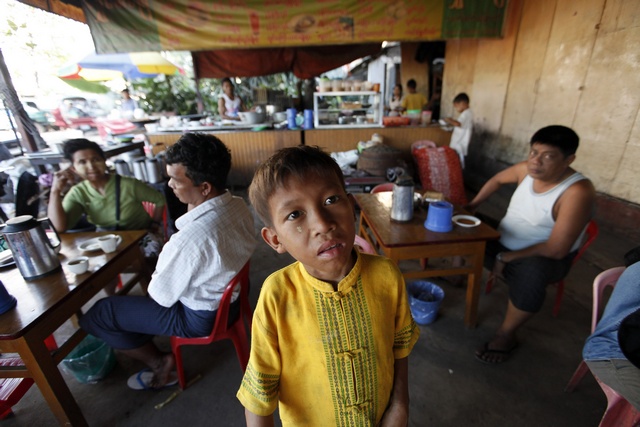In a recent Preliminary Republican Presidential Debate held at North Charleston, South Carolina on 14 January, Senator Rick Santorum received a large round of applause for making a critical remark, “let me tell you this, Mr. President. For every dollar of GDP, China creates five times as much pollution as we do here”. This example brings to light that an increase in GDP of a country does not necessarily indicate the situation of its people are improved –– nor that their government is contributing the best interests of global society as a whole.
Speaking to local people in the city hall of Myitkyina, the capital of the Kachin State, Burma’s President Thein Sein recently announced that the average individual income of the nation had increased from $800 in 2010-11 to nearly $1,300 per person by the end of his term. Burmese people may feel that their own Mr. President’s claim is ‘incredible’ –– they might like to ask him or his economic advisors if they can provide affirmative evidence to convince them of the statement.
A substantial problem of this statement is that the current national GDP the President referred to has not been adjusted for the consumer price index (CPI) to reflect changes in the price level of services and goods purchased by households. For example, in 2010 a household consisting of a married couple spent 1000 kyats (CPI 100 points) for preparing one essential meal package; if they needed to spend 1250 kyats (CPI 125 points) for preparing the same meal package in 2015, CPI was said to have increased by 1.25 times. Consequently, the nominal GDP of $1,300 needs to be readjusted by dividing it by 1.25 to reflect the actual value of GDP. For this reason, even if the GDP stated by Thein Sein was measured correctly, the actual monetary power of the citizens was $1300 divided by 1.25, that was only $1,040 indicating only 27% increase in terms of the real GDP of Burmese citizens.
The problem of using GDP as a prime measurement to indicate the wellbeing of people is not limited to the mere difference in the nominal and real GDPs. A national GDP is only an aggregate value and the GDP per capita is simply a result obtained from dividing the aggregate value in dollars by the population. Illustrating the aggregate GDP as representative of individual income is unfortunate because in many instances, this raw average will not reflect the real-life situation of many citizens.
The aggregate values can be expected to increase in accordance with the development of new technology and foreign investment. However, in many situations, things can also become much worse to many people in modern transitional economies, especially under the bad management of ‘non-compassionate’ governments.
For example, doing business with a foreign investment firm, a local ‘crony’ company takes the land of the farmers to operate some giant industry. Their land value will be certainly increased and the total GDP value will take account of this price change in the land value. However, for the pervious landowner farmers, losing their own and becoming jobless, their income goes down. However, the decline of the farmers’ income will not reflect in the total GDP or their small income is just considered negligible in relation to the exorbitant increase in land prices.
Another questionable point is the lack of accounting for the depreciation values of assets in calculating the national GDP. This problem is much substantial for a nation like Burma where the military oligarchs have almost absolute right to allocate the nation’s resources without significant counter-checks, transparency and accountability. In Burma, a range of median to giant industries are controlled by either the Ministry of Industry that operates state-owned enterprises or Myanmar Economic Corporation (MEC) that is officially under the Ministry of Defence. Many state owned enterprises faced a loss of $52.6 million during the 2012-13 fiscal year while the revenues of MEC are not held accountable to the parliament –– its profits are accessible only for a privileged group of people.
While the Ministry of Industry burdens the nation with unprofitable losses and the revenues of military business conglomerates remain inaccessible to the general public, we should notice that depreciation of assets owned by these industries are also a great waste to the nation over the time. For example, if certain industrial assets with a worth of $100 million at 2010 depreciated at a linear rate of eight percent per year, by the time of 2015 the assets’ replacement value will be only worth $60 million. The significant problem is that in measuring the GDP, the depreciation rates of assets are usually unaccounted; in this example, there will be an overestimate of $40 million in calculating the national GDP.
[related]
Even without taking account of the depreciation rates that would require meticulous work of calculation, there is also another gross problem of using different denominators: Burma’s census of 2014 reported a population of just 51.4 million, not 60 million. The latter was the denominator for calculating per capita GDP thoroughly used for the years before 2014. When Burma finds itself a much less population of only about 51 million, its per capita GDP will be automatically increased to a large margin by 17% in its GDP measurement of 2014-15.
Without critical examination of the contents, taking the GDP at face value will lead to an incorrect measuring of a national government’s performance for its people. Burma is currently ranked 157th out of 174 countries in the Corruption Perception Index, rendered as the third most corrupted country among all Asia Pacific nations. Indeed the nationwide election results of 2015 are perfectly affirmative to demonstrate the evidence of the public’s discontent over the incumbent government’s poor ability to improve the situation of the people. When economists grumble about their glitch in measurement methods, they quote a saying “Economics is the dismal science”. For Burmese people, democracy speaks more truth than the dismal science does.



